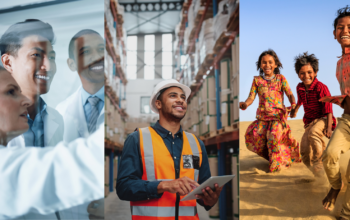Q&A with… Charles Kwanin
Q&A with Charles Kwanin on occasion of the Launch of the Africa Young Innovators for Health Award
Charles Kwanin is a young professional working in global health and former nurse practitioner from Ghana
Today, IFPMA and Speak Up Africa are launching the Africa Young Innovators for Health Award to highlight and support the work of pioneering young African entrepreneurs in the health sector. The Award is an investment in the human capital of Africa’s promising young entrepreneurs, providing financial and in-kind support to three winners of the Award so they can advance their healthcare solutions and develop their great potential as enablers of change. The 2021 edition of the Award will focus on supporting innovations that can make a difference for healthcare workers. The COVID-19 pandemic has amplified our awareness of the critical role doctors, nurses, healthcare professionals and community care workers play. At the resumed, virtual 73rd World Health Assembly, WHO Member States recognized the dedication and sacrifice of the millions of health and care workers at the forefront of the COVID-19 pandemic, unanimously designating 2021 as the International Year of Health and Care Workers. Moreover, the longstanding shortage of human and financial resources across the continent put a strain on healthcare workers and the healthcare system: Africa represents 25% of the global disease burden but concentrates only 3% of the global health workforce.
We asked Charles Kwanin, a former nurse practitioner from Ghana currently working at IFPMA’s Africa Engagement Committee and Graduate Student at the Graduate Institute of Geneva, how innovation can help solve some of the most pressing challenges faced by health workers on that continent.
Why did you decide to become a health worker and for how long have you been working as such?
This might sound a bit cheesy, but what motivated me is to aim for a world free of disease but, you know, that’s not simple. I took that path to help care for the clients and alleviate suffering from disease. I have practiced as a professional nurse for about seven years in total, including four years as a student nurse, in both rural and urban areas.
Was your training adapted to the reality of your job once you started?
My training provided me with the basic tools that enable me to provide appropriate, safe care to my patients. Nurses in Ghana are equipped to deal with the usual challenges that you might face as a health professional in your practice and at the hospital. We learn how to improvise, how to work under time constraints. Nevertheless, there are no specific ways that we can keep learning once in practice. This is where innovation can help bridge challenges we face as health workers and by health systems more generally, to bring us closer to finding solutions to enormous problems, especially in emergency situations as we have seen with the COVID-19 pandemic.
What are some of the biggest challenges you face in your daily job? What support is available to help you with these challenges?
I remember that when working in a rural area in Ghana, it was so hard to get blood stock in our laboratory because of inadequate storage capacity. This is quite a usual challenge for many rural areas in Africa. This issue was worrisome. The question was always when we can solve this. Thanks to Innovative solutions that are improving healthcare globally. When I spoke to my former colleagues, they told me now they can order through a system for a drone to send them blood at any point in time. Innovations like Zipline, a drone delivery service that delivers blood, vaccines and medical supplies precisely where and when they are needed, could have helped us save more lives if they had existed before. Another example is LifeBank, a company that uses data and technology to deliver blood, oxygen and essential medical products to hospitals in Nigeria and in Kenya. They deliver all these products by bikes, boats, trucks, tricycles, drones, etc. It’s so frustrating when you know what to do to save lives, but due to lack of the tools or resources you end up losing lives. I believe that’s where innovation comes in.
It’s extremely important that innovation is adapted to the local context, and that specific locals’ needs and capacity have to be considered when designing innovation solutions. For example, a lot of rural areas in Africa have regular power shortages that hamper healthcare services overall, which bigger cities might not face, so it’s important to look at what matters on the ground and what sectors have an impact on our health systems beyond health facilities.
What would you need to be able to carry out your job better?
I think that there are three main things that would really help nurses and health professionals:
- First, patient data storage. It is really challenging to retrieve your patient’s information and history. Healthcare workers in Ghana faced this challenge. When a patient goes to different hospitals or to different doctors because they can’t access all the services they need in one place and because there are not enough specialist healthcare providers to allow people to have the same doctor each time, patient’s data stays in each facility and you can’t access it. It would be extremely helpful to have a network system where health providers can access their patients’ health data at all times, reach patients easier, and share information with other health providers, while of course respecting confidentiality and data privacy. That would make human resources management easier too.
- Second, there are lots of apps that can connect the patient to healthcare providers, for example by using wearables, to enable remote care and monitoring. This kind of innovation can make the work of healthcare providers easier and faster, improving patient care. It also fosters patient-centered care, so we can more easily work with the patient on the care plan. It’s particularly important as in Ghana we see a rising burden of NCDs but at the same time infectious diseases like malaria, HIV/AIDS are still very prevalent–with connected platforms, we could monitor and retrieve patients history for all their conditions in one place, avoiding them going to different places. In the end, it would improve quality of care and make planning processes easier for health workers. This also promotes effective patient centered care.
- Third, the issue of access to quality, safe and affordable medicines is very important. Medicines are intended to cure or relieve patients from their symptoms but, if it ends up causing adverse reactions putting clients lives in danger, they begin to lose confidence in the healthcare workers and the system. Falsified medicines remain a big challenge on the African continent. Ghana is of no exception. There is the need for a strong regulatory system to check and monitor this issue in countries. If you look at the whole Africa continent, we have a lot of porous borders so smuggling of fake drugs around becomes so easy. Considering Innovative solutions like the mPedigree application which is helping to detect fake and counterfeit products. It is important to keep integrating these kinds of innovative solutions into hospital systems and make them available to as many facilities as possible. With this nurses and other healthcare workers can help identify falsified and substandard medicines. Furthermore, a continental body to serve as a liaison between countries on the continent to harmonize and regulate products like drugs, vaccines and others is a step in the right direction.
In what ways do you think the healthcare system in Ghana could be improved to facilitate the work of health workers?
There is always room for improvement in our health management and information systems. Connected platforms are key for information sharing. Also, identification of hotspots of different outbreaks, emergencies can easily be shared for alertness and necessary actions to be taken. We have seen with the COVID-19 pandemic that we can use existing platforms and integrate them with new ones. In addition, it is of course very important that a bigger proportion of people have an insurance package even though others are still missing on the health insurance lists. The government also has to expand the conditions covered by the insurance to help reduce out of pocket spending. We need to improve upon infrastructure and capacity, to help prepare for emergencies.
Finally, I realized that only teaching hospitals prioritize research into their work. I think that research and development centers should be integrated into all facilities in the country no matter the location, to improve evidence based care and solutions. With this local problem would be easily identified and innovative solutions would be developed to solve these challenges. In the end, it is really about the readiness of the health systems to integrate innovative solutions and leveraging technology that is adapted to each situation.
We believe in the power of young people as changemakers, innovators and leaders of today. To learn more about the Africa Young Innovators for Health Award and how to take part, please click here. We are looking forward to receiving applications starting 11 January 2021!
Author





